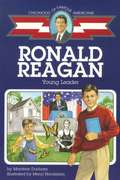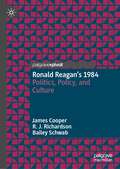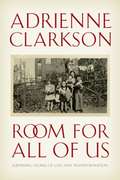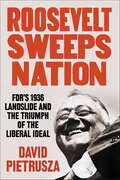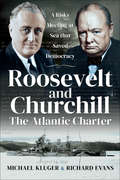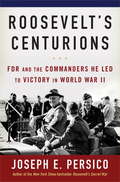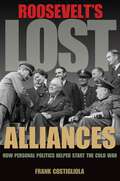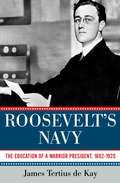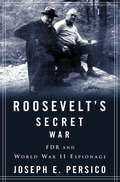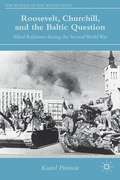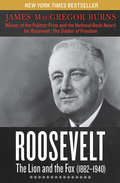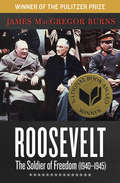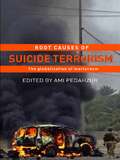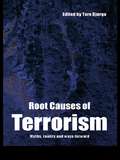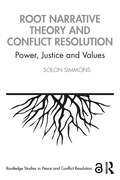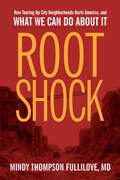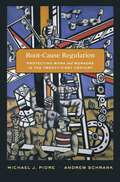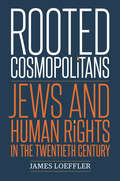- Table View
- List View
Ronald Reagan: The Politics of Symbolism
by Robert DallekA portrait of Reagan midway through his Presidency.
Ronald Reagan: Young Leader (Childhood of Famous Americans Series)
by Montrew DunhamOne of the most popular series ever published for young Americans, these classics have been praised alike by parents, teachers, and librarians. With these lively, inspiring, fictionalized biographies -- easily read by children of eight and up -- today's youngster is swept right into history.
Ronald Reagan’s 1984: Politics, Policy, and Culture
by James Cooper R.J. Richardson Bailey SchwabForty years after Ronald Reagan’s successful re-election campaign, this book explores the significance of the year 1984 in the making of Reagan’s presidential record and the shaping of his legacy. The authors examine the broader context of how Reagan impacted the nature of the US presidency and international relations during the Cold War, and how this in turn interacted with American popular culture. Serving as an introduction to academics, students and the interested public into what is a rapidly increasingly Reagan scholarship, this book will also appeal to anyone interested in US elections, the evolving nature of the US presidency, and American culture more generally.
Ronald W. Reagan: Fortieth President of the United States
by Neal E. RobbinsPresents the life of Ronald Reagan, including his childhood, education, employment, and political career.
Room For All Of Us
by Adrienne ClarksonIn this exciting and revealing personal inquiry, former governor general Adrienne Clarkson explores the immigrant experience through the people who have helped transform Canada. The Canadians she befriends--whether an Ismaili doctor, a Doukhobor farmer, a Holocaust survivor, or a Vietnam War deserter--illustrate the changing idea of what it means to be Canadian and the kind of country we have created over the decades. Like her, many of the people who came did not have a real choice: they often arrived friendless and with a sense of loss. Yet their struggles and successes have enriched Canada immeasurably.What drove them to become the kind of people they have become? What would have happened to them if Canada had not taken them in? What have they added to our national life us as we go forward in the twenty-first century? Written with humour, insight and personal revelation, Room for All of Us is a tale of many destinies. Like W.G. Sebald's The Emigrants, Clarkson's book offers a richly textured, intimate and unforgettable portrait of a changing country and its people.
Roosevelt Sweeps Nation: FDR's 1936 Landslide and the Triumph of the Liberal Ideal
by David PietruszaWinner of the 2023 Independent Publisher Book Awards Gold Medal for US History From the acclaimed author of 1920: The Year of the Six Presidents and 1960: LJB vs JFK vs Nixon—The Epic Campaign that Forged Three Presidencies comes a dazzling panorama of presidential and political personalities, ambitions, plots, and counterplots; racism, anti-Semitism, anti-socialism, and anti-communism, and the landslide referendum on FDR’s New Deal policies in the 1936 presidential election. Award-winning historian David Pietrusza boldly steers clear of the pat narrative regarding Franklin Roosevelt’s unprecedented 1936 re-election landslide, weaving an enormously more intricate, ever more surprising tale of a polarized nation; of America’s most complex, calculating, and politically successful president, Franklin D. Roosevelt, at the very top of his Machiavellian game; and the unlocking of the puzzle of how our society, our politics, and our parties fitfully reinvented themselves. With in-depth examinations of rabble-rousing Democratic US Senator Huey Long and his assassination before he was able to challenge FDR in ’36; powerful, but widely hated, newspaper baron William Randolph Hearst, who blasted FDR’s “Raw Deal”; wildly popular, radical radio commentator Father Coughlin; the steamrolled passage of Social Security and backlash against it; the era’s racism and anti-Semitism; American Socialism and Communism; and a Supreme Court seemingly bent on dismantling the New Deal altogether, Roosevelt Sweeps Nation is a vivid portrait of a dynamic Depression-Era America. Crafting his account from an impressive and unprecedented collection of primary and secondary sources, Pietrusza has produced an engrossing, original, and authoritative account of an election, a president, and a nation at the crossroads. The nation’s stakes were high . . . and the parallels hauntingly akin to today’s dangerously strife-ridden political and culture wars.
Roosevelt and Churchill: A Risky Meeting at Sea that Saved Democracy
by Richard J. Evans Michael KlugerThe dramatic secret meeting between Churchill and FDR that forged their alliance against global fascism is brought to life in this WWII history.On August 14, 1941, Prime Minister Winston Churchill and President Franklin D. Roosevelt issued a joint declaration of goals for the world after the Second World War. The Atlantic Charter was a powerful statement against tyranny and an important display of the “Special Relationship” between the UK and the US.Roosevelt and Churchill: The Atlantic Charter tells the story behind this momentous document and the secret meeting that led to its creation. Churchill and Roosevelt barely knew each other when they met off the coast of Newfoundland aboard the USS Augusta. After a desperate dash across the U-boat infested Atlantic, Churchill spent four days at sea with Roosevelt, establishing both a personal friendship and an international alliance that would change the world.Exploring the lives of both men, the authors also include biographies of those who were vital to the process: Roosevelt’s Secretary of Commerce Harry Hopkins and foreign policy advisor Sumner Welles; and Churchill’s confidants Lord Beaverbrook, Lord Cadogan, and his son Randolph Churchill.
Roosevelt and Churchill: A Risky Meeting at Sea that Saved Democracy
by Richard J. Evans Michael KlugerThe dramatic secret meeting between Churchill and FDR that forged their alliance against global fascism is brought to life in this WWII history.On August 14, 1941, Prime Minister Winston Churchill and President Franklin D. Roosevelt issued a joint declaration of goals for the world after the Second World War. The Atlantic Charter was a powerful statement against tyranny and an important display of the “Special Relationship” between the UK and the US.Roosevelt and Churchill: The Atlantic Charter tells the story behind this momentous document and the secret meeting that led to its creation. Churchill and Roosevelt barely knew each other when they met off the coast of Newfoundland aboard the USS Augusta. After a desperate dash across the U-boat infested Atlantic, Churchill spent four days at sea with Roosevelt, establishing both a personal friendship and an international alliance that would change the world.Exploring the lives of both men, the authors also include biographies of those who were vital to the process: Roosevelt’s Secretary of Commerce Harry Hopkins and foreign policy advisor Sumner Welles; and Churchill’s confidants Lord Beaverbrook, Lord Cadogan, and his son Randolph Churchill.
Roosevelt's Centurions: FDR and the Commanders He Led to Victory in World War II
by Joseph E. PersicoAll American presidents are commanders in chief by law. Few perform as such in practice. In Roosevelt's Centurions, distinguished historian Joseph E. Persico reveals how, during World War II, Franklin D. Roosevelt seized the levers of wartime power like no president since Abraham Lincoln during the Civil War. Declaring himself "Dr. Win-the-War," FDR assumed the role of strategist in chief, and, though surrounded by star-studded generals and admirals, he made clear who was running the war. FDR was a hands-on war leader, involving himself in everything from choosing bomber targets to planning naval convoys to the design of landing craft. Persico explores whether his strategic decisions, including his insistence on the Axis powers' unconditional surrender, helped end or may have prolonged the war. Taking us inside the Allied war councils, the author reveals how the president brokered strategy with contentious allies, particularly the iron-willed Winston Churchill; rallied morale on the home front; and handpicked a team of proud, sometimes prickly warriors who, he believed, could fight a global war. Persico's history offers indelible portraits of the outsize figures who roused the "sleeping giant" that defeated the Axis war machine: the dutiful yet independent-minded George C. Marshall, charged with rebuilding an army whose troops trained with broomsticks for rifles, eggs for hand grenades; Dwight Eisenhower, an unassuming Kansan elevated from obscurity to command of the greatest fighting force ever assembled; the vainglorious Douglas MacArthur; and the bizarre battlefield genius George S. Patton. Here too are less widely celebrated military leaders whose contributions were just as critical: the irascible, dictatorial navy chief, Ernest King; the acerbic army advisor in China, "Vinegar" Joe Stilwell; and Henry H. "Hap" Arnold, who zealously preached the gospel of modern air power. The Roosevelt who emerges from these pages is a wartime chess master guiding America's armed forces to a victory that was anything but foreordained. What are the qualities we look for in a commander in chief? In an era of renewed conflict, when Americans are again confronting the questions that FDR faced--about the nature and exercise of global power--Roosevelt's Centurions is a timely and revealing examination of what it takes to be a wartime leader in a freewheeling, complicated, and tumultuous democracy.Advance praise for Roosevelt's Centurions "[A] sweeping, top-down account of 1939-45 from the point of view of FDR, his cabinet and his leading generals and admirals. . . . Long wars demand long books, but these are 550 pages of lively prose by a good writer who knows his subject."--Kirkus Reviews "When I was a boy growing up in the South Bronx, my heroes were Roosevelt's centurions. As a soldier for thirty-five years, I made them my mentors and models. These men were heroes. They were fallible and occasionally vain, but we were certainly blessed to have such Americans leading the Greatest Generation during the world's greatest conflict. Of course, the greatest centurion of them all was FDR himself, who knew how to lead his commanders, stroke their egos, and get the best from them, yet never left any doubt as to who was commander in chief. Joe Persico, my valued collaborator on my memoirs, has brought his formidable talents to bear to bring the centurions to life. He is at the top of his game in this defining classic."--Colin L. Powell, General, U.S. Army (Retired).
Roosevelt's Lost Alliances: How Personal Politics Helped Start the Cold War
by Frank CostigliolaHow the Grand Alliance of World War II succeeded—and then collapsed—because of personal politicsIn the spring of 1945, as the Allied victory in Europe was approaching, the shape of the postwar world hinged on the personal politics and flawed personalities of Roosevelt, Churchill, and Stalin. Roosevelt's Lost Alliances captures this moment and shows how FDR crafted a winning coalition by overcoming the different habits, upbringings, sympathies, and past experiences of the three leaders. In particular, Roosevelt trained his famous charm on Stalin, lavishing respect on him, salving his insecurities, and rendering him more amenable to compromise on some matters.Yet, even as he pursued a lasting peace, FDR was alienating his own intimate circle of advisers and becoming dangerously isolated. After his death, postwar cooperation depended on Harry Truman, who, with very different sensibilities, heeded the embittered "Soviet experts" his predecessor had kept distant. A Grand Alliance was painstakingly built and carelessly lost. The Cold War was by no means inevitable.This landmark study brings to light key overlooked documents, such as the Yalta diary of Roosevelt's daughter Anna; the intimate letters of Roosevelt's de facto chief of staff, Missy LeHand; and the wiretap transcripts of estranged adviser Harry Hopkins. With a gripping narrative and subtle analysis, Roosevelt's Lost Alliances lays out a new approach to foreign relations history. Frank Costigliola highlights the interplay between national political interests and more contingent factors, such as the personalities of leaders and the culturally conditioned emotions forming their perceptions and driving their actions. Foreign relations flowed from personal politics—a lesson pertinent to historians, diplomats, and citizens alike.
Roosevelt's Navy
by James Tertius de KayFDR as never seen before: His formative years as Woodrow Wilson's Assistant Secretary of the Navy, evolving from political neophyte to visionary leader This is the story of a very different Franklin Delano Roosevelt from the one usually found in the history books. This is a much younger, untested FDR, a physically active, pre-polio FDR, as seen during his early years in Washington, learning the complexities of gaining and exercising power as Woodrow Wilson's ambitious Assistant Secretary of the Navy. He arrives in Washington as a somewhat shallow, inexperienced political neophyte possessed of little more than a famous name, but by the time he leaves the Navy eight years later he will have transformed himself into a seasoned professional, wise to the ways of power, a visionary ready and eager to take his place on the world stage. FDR's early years in Washington also include the most tumultuous period in his personal life, when, caught in a difficult marriage, he is forced to choose between his own personal happiness and his towering political ambitions. He must deal at close quarters with Congress, with the Administration, with the military, with big business. Lastly, but crucially, he confronts himself, learning something about his potential, his limitations, and his ambition. Such self-knowledge is perhaps the most valuable single gift that a leader of a democracy can hope for.
Roosevelt's Navy: The Education of a Warrior President, 1882-1920
by James Tertius de KayFDR as never seen before: His formative years as Woodrow Wilson's Assistant Secretary of the Navy, evolving from political neophyte to visionary leader. This is the story of a very different Franklin Delano Roosevelt from the one traditionally found in the history books. This is a much younger, untested, pre-polio FDR, learning the complexities of gaining and exercising power as Woodrow Wilson's ambitious Assistant Secretary of the Navy. He arrives in Washington as an inexperienced political amateur possessed of little more than a famous name, but by the time he leaves the Navy eight years later he will have transformed himself into a seasoned professional, wise to the ways of power, a visionary ready and eager to take his place on the world stage. FDR's early years in Washington also include the most tumultuous period in his personal life, when, caught in a difficult marriage, he is forced to choose between his own personal happiness and his political ambitions. He must deal at close quarters with Congress, with the Administration, and with the military. Lastly, but crucially, he confronts himself, learning something about his potential, his limitations, and his growing ambition to become president of the United States.
Roosevelt's Purge: How FDR Fought to Change the Democratic Party
by Susan DunnIn his first term in office, Franklin Roosevelt helped pull the nation out of the Great Depression with his landmark programs. In November 1936, every state except Maine and Vermont voted enthusiastically for his reelection. But then the political winds shifted. Not only did the Supreme Court block some of his transformational experiments, but he also faced serious opposition within his own party. Conservative Democrats such as Senators Walter George of Georgia and Millard Tydings of Maryland allied themselves with Republicans to vote down New Deal bills. Susan Dunn tells the dramatic story of FDR’s unprecedented battle to drive his foes out of his party by intervening in Democratic primaries and backing liberal challengers to conservative incumbents. Reporters branded his tactic a “purge”—and the inflammatory label stuck. Roosevelt spent the summer months of 1938 campaigning across the country, defending his progressive policies and lashing out at conservatives. Despite his efforts, the Democrats took a beating in the midterm elections. The purge stemmed not only from FDR’s commitment to the New Deal but also from his conviction that the nation needed two responsible political parties, one liberal, the other conservative. Although the purge failed, at great political cost to the president, it heralded the realignment of political parties that would take place in the 1960s, 1970s, and 1980s. By the end of the century, the irreconcilable tensions within the Democratic Party had exploded, and the once solidly Democratic South was solid no more. It had taken sixty years to resolve the tangled problems to which FDR devoted one frantic, memorable summer.
Roosevelt's Secret War: FDR and World War II Espionage
by Joseph E. PersicoDespite all that has already been written on Franklin Delano Roosevelt, Joseph Persico has uncovered a hitherto overlooked dimension of FDR's wartime leadership: his involvement in intelligence and espionage operations.Roosevelt's Secret War is crowded with remarkable revelations:-FDR wanted to bomb Tokyo before Pearl Harbor-A defector from Hitler's inner circle reported directly to the Oval Office-Roosevelt knew before any other world leader of Hitler's plan to invade Russia-Roosevelt and Churchill concealed a disaster costing hundreds of British soldiers' lives in order to protect Ultra, the British codebreaking secret-An unwitting Japanese diplomat provided the President with a direct pipeline into Hitler's councilsRoosevelt's Secret War also describes how much FDR had been told--before the Holocaust--about the coming fate of Europe's Jews. And Persico also provides a definitive answer to the perennial question Did FDR know in advance about the attack on Pearl Harbor?By temperament and character, no American president was better suited for secret warfare than FDR. He manipulated, compartmentalized, dissembled, and misled, demonstrating a spymaster's talent for intrigue. He once remarked, "I never let my right hand know what my left hand does." Not only did Roosevelt create America's first central intelligence agency, the OSS, under "Wild Bill" Donovan, but he ran spy rings directly from the Oval Office, enlisting well-placed socialite friends. FDR was also spied against. Roosevelt's Secret War presents evidence that the Soviet Union had a source inside the Roosevelt White House; that British agents fed FDR total fabrications to draw the United States into war; and that Roosevelt, by yielding to Churchill's demand that British scientists be allowed to work on the Manhattan Project, enabled the secrets of the bomb to be stolen. And these are only a few of the scores of revelations in this constantly surprising story of Roosevelt's hidden role in World War II.
Roosevelt, Churchill, and The Baltic Question: Allied Relations during the Second World War (The World of the Roosevelts)
by Kaarel PiirimäeIn 1940, the USSR occupied and annexed Estonia, Latvia, and Lithuania, leading to calls by many that the Soviets had violated international law. This book examines British, US, and Soviet policies toward the Baltic states, placing the true significance of the Baltic question in its proper geopolitical context.
Roosevelt, Franco, and the End of the Second World War (The World of the Roosevelts)
by Joan Maria ThomàsThis book is a study of the relations between the US and Spain, particularly during the period from 1943 to 1945, when the Roosevelt Administration and the Joint Chiefs of Staff decided to challenge the Pro-Franco Regime, culminating in the Battle of Wolfram and the embargo of petroleum products.
Roosevelt: The Lion and the Fox (Roosevelt #1940)
by James MacGregor Burns&“A brilliant full-length portrait of Franklin Roosevelt the politician&”—the first in an award-winning two-volume biography (The Christian Science Monitor). Franklin Delano Roosevelt was the longest serving president in United States history, reshaping the country during the crises of the Great Depression and World War II. But before his ascension to the presidency, FDR laid the groundwork for his unprecedented run with decades of canny political maneuvering and steady consolidation of power. In this remarkable New York Times–bestselling biography, Pulitzer Prize–winning historian James MacGregor Burns traces FDR&’s rise and the peculiar blend of strength and cunning that made him such a uniquely transformative figure. Weaving together lively narrative and impressive scholarship, Burns reconstructs his youth and education at Groton and Harvard, his relationships with his cousins Theodore and Eleanor, his immersion in New York State politics, and his rise to national prominence, all the way through his first two terms as president, which saw the historic New Deal take hold and the drumbeats of World War II begin. Originally published in 1956, The Lion and the Fox was among the first studies of Roosevelt—and it remains a landmark record of his ambitions, talents, and flaws. Hailed by the New York Times as &“a sensitive, shrewd, and challenging book&” and by Newsweek as &“a case study unmatched in American political writings,&” Burns&’s stunning achievement is the life story of a fascinating political figure.
Roosevelt: The Soldier of Freedom (1940-1945) (Roosevelt #2)
by James MacGregor BurnsThe &“engrossing&” Pulitzer Prize and National Book Award–winning history of FDR&’s final years (Barbara Tuchman). The second entry in James Macgregor Burns&’s definitive two-volume biography of Franklin Delano Roosevelt begins with the president&’s precedent-breaking third term election in 1940, just as Americans were beginning to face the likelihood of war. Here, Burns examines Roosevelt&’s skillful wartime leadership as well as his vision for post-war peace. Hailed by William Shirer as &“the definitive book on Roosevelt in the war years,&” and by bestselling author Barbara Tuchman as &“engrossing, informative, endlessly readable,&” The Soldier of Freedom is a moving profile of a leader gifted with rare political talent in an era of extraordinary challenges, sacrifices, heroism, and hardship.
Root Causes of Suicide Terrorism: The Globalization of Martyrdom (Political Violence)
by Ami PedahzurThis highly topical new study clearly shows how there are at least two reasons to question the central role that is assigned to religion, in particular Islam, when explaining suicide terrorism. suicide terrorism is a modern phenomenon, yet Islam is a very old religion. Except for two periods in the twelfth and eighteenth centuries, suicide was never part of Islamist beliefs and behaviours. Actually, Islam clearly forbids suicide, hence, the argument that Islamic religious beliefs are the main cause of suicide terrorism is inherently dubious many suicide attacks have been carried out by secular organizations with little connection to fundamentalist Islam: Palestinian Fatah; the Popular Front for the Liberation of Palestine; and the Kurdish Workers Party. Moreover, one of the organizations that has employed this strategy devastatingly and regularly is the LTTE (Liberation Tigers of Tamil Elam). Not only are members of this organization not Muslim, most of them are not religious at all. This superb new book contains essays by some of the world's leading scholars of terrorism and political violence. It is essential reading for students of terrorism, political science and Middle Eastern politics, and useful to students of social psychology, theology and history.
Root Causes of Terrorism: Myths, Reality and Ways Forward
by Tore BjørgoThis team of international experts analyses the possibilities and limitations of preventing or reducing terrorism by addressing the factors that give rise to it and sustain it. The key questions raised include:* what are the main circumstances that provide preconditions for the emergence of various types of terrorism?* what are the typical precipit
Root Narrative Theory and Conflict Resolution: Power, Justice and Values (Routledge Studies in Peace and Conflict Resolution)
by Solon J. SimmonsThis book introduces Root Narrative Theory, a new approach for narrative analysis, decoding moral politics, and for building respect and understanding in conditions of radical disagreement. This theory of moral politics bridges emotion and reason, and, rather than relying on what people say, it helps both the analyst and the practitioner to focus on what people mean in a language that parties to the conflict understand. Based on a simple idea—the legacy effects of abuses of power—the book argues that conflicts only endure and escalate where there is a clash of interpretations about the history of institutional power. Providing theoretically complex but easy-to-use tools, this book offers a completely new way to think about storytelling, the effects of abusive power on interpretation, the relationship between power and conceptions of justice, and the origins and substance of ultimate values. By locating the source of radical disagreement in story structures and political history rather than in biological or cognitive systems, Root Narrative Theory bridges the divides between reason and emotion, realism and idealism, without losing sight of the inescapable human element at work in the world’s most devastating conflicts. This book will be of much interest to students of conflict resolution, peace studies and International Relations, as well as to practitioners of conflict resolution.
Root Narrative Theory and Conflict Resolution: Power, Justice and Values (Routledge Studies in Peace and Conflict Resolution)
by Solon SimmonsThis book introduces Root Narrative Theory, a new approach for narrative analysis, decoding moral politics, and for building respect and understanding in conditions of radical disagreement.This theory of moral politics bridges emotion and reason, and, rather than relying on what people say, it helps both the analyst and the practitioner to focus on what people mean in a language that parties to the conflict understand. Based on a simple idea—the legacy effects of abuses of power—the book argues that conflicts only endure and escalate where there is a clash of interpretations about the history of institutional power. Providing theoretically complex but easy-to-use tools, this book offers a completely new way to think about storytelling, the effects of abusive power on interpretation, the relationship between power and conceptions of justice, and the origins and substance of ultimate values. By locating the source of radical disagreement in story structures and political history rather than in biological or cognitive systems, Root Narrative Theory bridges the divides between reason and emotion, realism and idealism, without losing sight of the inescapable human element at work in the world’s most devastating conflicts.This book will be of much interest to students of conflict resolution, peace studies and International Relations, as well as to practitioners of conflict resolution.The Open Access version of this book, available at http://www.taylorfrancis.com, has been made available under a Creative Commons Attribution-Non Commercial-No Derivatives (CC-BY-NC-ND) 4.0 license.
Root Shock: How Tearing Up City Neighborhoods Hurts America, And What We Can Do About It
by Mindy Thompson FulliloveRoot Shock examines 3 different U.S. cities to unmask the crippling results of decades-old disinvestment in communities of color and the urban renewal practices that ultimately destroyed these neighborhoods for the advantage of developers and the elite. Like a sequel to the prescient warnings of urbanist Jane Jacobs, Dr. Mindy Thompson Fullilove reveals the disturbing effects of decades of insensitive urban renewal projects on communities of color. For those whose homes and neighborhoods were bulldozed, the urban modernization projects that swept America starting in 1949 were nothing short of an assault. Vibrant city blocks - places rich in culture - were torn apart by freeways and other invasive development, devastating the lives of poor residents. Fullilove passionately describes the profound traumatic stress- the "root shock"that results when a neighborhood is demolished. She estimates that federal and state urban renewal programs, spearheaded by business and real estate interests, destroyed 1,600 African American districts in cities across the United States. But urban renewal didn't just disrupt black communities: it ruined their economic health and social cohesion, stripping displaced residents of their sense of place as well. It also left big gashes in the centers of cities that are only now slowly being repaired. Focusing on the Hill District of Pittsburgh, the Central Ward in Newark, and the small Virginia city of Roanoke, Dr. Fullilove argues powerfully against policies of displacement. Understanding the damage caused by root shock is crucial to coping with its human toll and helping cities become whole. Mindy Thompson Fullilove, MD, is a research psychiatrist at New York State Psychiatric Institute and professor of clinical psychiatry and public health at Columbia University. She is the author of five books, including Urban Alchemy.
Root-Cause Regulation: Protecting Work and Workers in the Twenty-First Century
by Michael J. PioreWork is now more deadly than war, killing approximately 2.3 million people a year worldwide. The United States, with its complex regulatory system, has one of the highest rates of occupational fatality in the developed world, and deteriorating working conditions more generally. Why, after a century of reform, are U.S. workers growing less safe and secure? Comparing U.S. regulatory practices to their European and Latin American counterparts, Root-Cause Regulation provides insight into the causes of this downward trend and ways to reverse it, offering lessons for rich and poor countries alike. The United States assigns responsibility for wages and hours, collective bargaining, occupational safety, and the like to various regulatory agencies. In France, Spain, and their former colonies, a single agency regulates all firms. Drawing on history, sociology, and economics, Michael Piore and Andrew Schrank examine why these systems developed differently and how they have adapted to changing conditions over time. The U.S. model was designed for the inspection of mass production enterprises by inflexible specialists and is ill-suited to the decentralized and destabilized employment of today. In the Franco-Iberian system, by contrast, the holistic perspective of multitasking generalists illuminates the root causes of noncompliance—which often lie in outdated techniques and technologies—and offers flexibility to tailor enforcement to different firms and market conditions. The organization of regulatory agencies thus represents a powerful tool. Getting it right, the authors argue, makes regulation not the job-killer of neoliberal theory but a generative force for both workers and employers.
Rooted Cosmopolitans: Jews and Human Rights in the Twentieth Century
by James LoefflerA stunningly original look at the forgotten Jewish political roots of contemporary international human rights, told through the moving stories of five key activists The year 2018 marks the seventieth anniversary of two momentous events in twentieth-century history: the birth of the State of Israel and the creation of the Universal Declaration of Human Rights. Both remain tied together in the ongoing debates about the Israeli-Palestinian conflict, global antisemitism, and American foreign policy. Yet the surprising connections between Zionism and the origins of international human rights are completely unknown today. In this riveting account, James Loeffler explores this controversial history through the stories of five remarkable Jewish founders of international human rights, following them from the prewar shtetls of eastern Europe to the postwar United Nations, a journey that includes the Nuremberg and Eichmann trials, the founding of Amnesty International, and the UN resolution of 1975 labeling Zionism as racism. The result is a book that challenges long-held assumptions about the history of human rights and offers a startlingly new perspective on the roots of the Israeli-Palestinian conflict.

